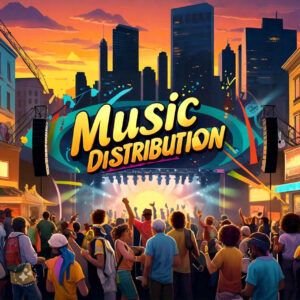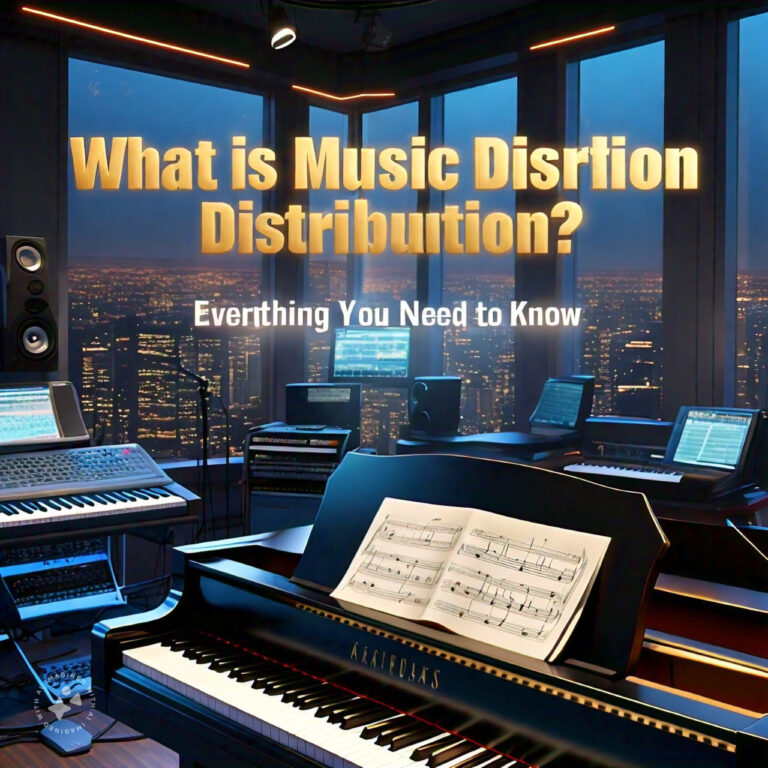Hello, are you a songwriter or an Artist and you have heard of Music Distribution but you don’t know much about it?, I have goodnews for you, Here in this article we are going to tell you everything you may need to know about Music distribution.
Hey there, fellow musicians! If you’ve poured your heart and soul into crafting amazing songs, you’re probably wondering how to get them out there for the world to hear. That’s where music distribution comes in. I’ve been navigating the music industry for years, and I’m here to share everything I’ve learned about this crucial step in your music career.
What is Music Distribution?
Let’s start with the basics. Music distribution is simply the process of getting your music onto platforms where people can listen to it and (hopefully!) buy it. This used to mean pressing CDs and shipping them to stores, but in today’s digital world, it’s all about streaming services like Spotify, Apple Music, Amazon Music, and countless others.
Music distribution is the process of getting your music from the recording studio to the consumer. It involves various channels, including physical distribution (CDs, vinyl), digital distribution (downloads, streaming), and online platforms (music stores, streaming services). Think of it as a supply chain, where your music is the product, and the distributor is the middleman connecting you to your audience.
Think of it like this: You’ve baked the most delicious cake (your music), and now you need to deliver it to hungry customers (your fans) all over the world. Music distribution is your delivery service, ensuring your music reaches every corner of the globe.
The cool thing about modern distribution is that it’s not just for major label artists anymore. Independent artists like you and me have more power than ever to take control of our music and reach our audiences directly. That’s why understanding music distribution is so important – it’s your ticket to getting heard.

Types of Music Distribution Deals
-
Exclusive vs non-exclusive deals: Exclusive deals grant the distributor sole rights to your music, while non-exclusive deals allow you to work with multiple distributors.
-
Single-track vs album deals: Distributors may offer deals for individual tracks or entire albums.
-
Label deals vs independent distribution: You can sign with a record label or distribute your music independently through aggregators or direct-to-consumer platforms.
Physical vs. Digital Distribution
While digital distribution has become the dominant force in the music industry, physical distribution (CDs, vinyl records) still exists for certain genres and audiences. However, this article will primarily focus on digital distribution, as it’s the most accessible and relevant option for most independent artists today.
How Does Music Distribution Work?
Now that we know what music distribution is, let’s dive into how it actually works. It might seem like magic, but there’s a clear process behind getting your songs onto those streaming platforms.
-
Prepare Your Music: Make sure your tracks are high-quality, properly mastered, and ready for release. This includes creating eye-catching album artwork and writing compelling metadata (song titles, artist names, genre, etc.).
-
Choose a Distributor: This is the company that will handle the technical aspects of delivering your music to digital stores and streaming services. There are many options out there, from DIY platforms to full-service distributors who offer additional support and marketing tools. We’ll discuss choosing the right distributor later in this article.
-
Upload Your Music: Your chosen distributor will provide a platform where you can upload your music files, artwork, and metadata.
-
Distribution to Platforms: Once your music is uploaded and approved, your distributor will send it to all the digital stores and streaming services you’ve selected.
-
Sit Back and Collect Royalties: When people listen to or buy your music, you’ll earn royalties (payments) from the streaming services and stores. Your distributor will collect these royalties and pay them out to you according to their specific agreement.
Also Read: TikTok For Musicians: 17 Content Ideas To Grow Your Following
Why You Need Music Distribution?: The Benefits for Your Career
Okay, you might be thinking, “All of this sounds complicated. Do I really need music distribution?” The short answer is yes! Here’s why:
- Reach a Global Audience: Distribution gets your music in front of millions of potential listeners around the world. It’s like having your songs playing on a massive virtual radio station that never stops.
- Make Money from Your Music: While it might not make you a millionaire overnight, music distribution opens up opportunities for earning royalties from streams, downloads, and even sync placements (getting your music used in films, TV shows, or commercials).
- Build Your Brand: Having your music on major platforms gives you a sense of legitimacy and professionalism. It makes you look like the serious artist you are.
And remember, it’s not just about getting your music out there – it’s about getting it out there the right way. A good distributor will help you ensure your metadata is accurate, your music sounds its best, and you’re making the most of the available tools and resources.
Choosing the Right Music Distributor: Key Factors to Consider
So, you’re ready to take the plunge into the world of music distribution. Great! But now you need to choose a distributor. This is a big decision, as it can impact your reach, royalties, and overall experience. Here are some key factors to consider:
-
Pricing: Distributors have different pricing models. Some charge upfront fees per release or per year, while others take a percentage of your royalties. Be sure to compare pricing carefully and choose an option that fits your budget.
-
Services Offered: Some distributors offer basic distribution services, while others provide additional features like marketing tools, playlist pitching, sync licensing opportunities, and even physical distribution. Think about what services you need now and might need in the future.
-
Reputation and Track Record: Research different distributors to see what other artists are saying about them. Look for companies with a good reputation for customer service, timely payments, and reliable distribution.
-
Ease of Use: If you’re not tech-savvy, choose a platform that’s user-friendly and offers excellent customer support. You don’t want to get stuck trying to figure out complicated software.
Some popular music distributors for independent artists include:
- DistroKid: Known for its affordable pricing and user-friendly platform.
- TuneCore: Offers a wide range of services, including publishing administration.
- CD Baby: One of the oldest distributors with a strong reputation for artist support.
Remember, there’s no one-size-fits-all solution. Do your research, compare your options, and choose a distributor that aligns with your goals and budget.
The Role of Music Aggregators
One important term to understand is “music aggregator.” Aggregators are companies that partner with multiple digital stores and streaming services. By working with an aggregator, you only need to upload your music once, and they’ll distribute it to all the platforms they’re connected to. This saves you the hassle of dealing with each platform individually.
DIY Music Distribution: Is It Right for You?
If you’re a DIY kind of artist, you might be tempted to handle your music distribution yourself. While it’s certainly possible, it’s important to weigh the pros and cons.
Pros:
- Full Control: You have complete control over every aspect of the process.
- Potential for Higher Royalties: You won’t have to pay any commission to a distributor.
Cons:
- Time-Consuming: It takes a lot of time and effort to research platforms, format your music correctly, and deal with any technical issues.
- Limited Resources: You might not have access to the same tools and resources that a distributor can provide, like marketing support and playlist pitching.
If you have the time, technical skills, and patience, DIY distribution can be a viable option. However, most artists find that using a distributor saves them time and energy, allowing them to focus on making music.
Common Music Distribution Mistakes to Avoid
Even with the best intentions, it’s easy to make mistakes when distributing your music. Here are some common pitfalls to avoid:
- Incorrect Metadata: Double-check your song titles, artist names, genres, and release dates to ensure everything is accurate. Incorrect metadata can lead to your music being miscategorized or not showing up in search results.
- Copyright Infringement: Make sure you own the rights to all the music and artwork you’re distributing. Using copyrighted material without permission can lead to legal trouble.
- Ignoring Analytics: Once your music is out there, track your analytics to see how it’s performing. This data can help you make informed decisions about your marketing and promotion efforts.
By taking the time to prepare your music properly and choosing a reputable distributor, you can avoid these common mistakes and ensure a smooth distribution process.
Music Distribution Contracts: What to Look Out For
- Contract terms and conditions: Clarify the duration, territory, and scope of the agreement.
- Royalties and advances: Negotiate fair royalties and advances, ensuring you receive a fair share of earnings.
- Rights and ownership: Protect your intellectual property and creative control.
The Future of Music Distribution: Trends and Innovations
The music industry is constantly evolving, and music distribution is no exception. Here are some emerging trends and innovations to keep an eye on:
- Blockchain Technology: Blockchain could revolutionize music distribution by creating a decentralized system where artists have more control over their music and royalties.
- Artificial Intelligence (AI): AI-powered tools can help artists with everything from music mastering to playlist pitching, making the distribution process even more efficient.
It’s exciting to think about the possibilities that technology holds for music distribution. As independent artists, it’s important to stay informed and adapt to these changes to stay ahead of the curve.
Related Posts:
- How To Find Your Own Sound as an R&B Artist: Top 10 Tips
- TikTok For Musicians: 17 Content Ideas To Grow Your Following
- AI Tools for Songwriting: 10 Generators to Step Up Your Game
- Everything You Need To Know About 360 Deals in the Music Industry
- How To Write a Good R&B Song Like a Pro Within 30 Minutes – 10 Tips
- How To Make Money From Songwriting as a Songwriter – 12 Ways


